Diversity work before it had a name
October 21, 2021 — Nicole Hamon ’78 and Frank Thomas ’71 were pioneers in the work they did for Grinnell College. Hamon guided international students through their time at Grinnell, while Thomas mentored and focused on increasing the number of students and faculty of color. With the passing of each over the summer, we reflect back on the lasting impact their remarkable work had on the College and the lives of Grinnellians.
Nicole Hamon ’78
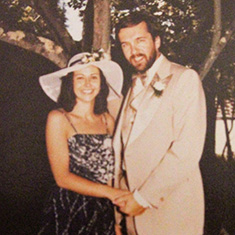 Nicole Hamon ’78 with her
Nicole Hamon ’78 with her
husband, Richard "Dick" Vos
As a young girl growing up in La Guerche-de-Bretagne, a small village in Brittany, France, Nicole dreamed about exploring the world. As a teen, she spent summers learning English on the Isle of Jersey, a Channel Island between England and France. After high school she became an au pair, honing her Spanish-language skills in Barcelona and her English-language skills in London.
To fulfill coursework requirements for English language studies, Hamon arrived in Grinnell during August 1973 to work as a language assistant in the French department. She helped teach introductory French and took courses in Russian. And she met her future husband, Richard “Dick” Vos, who was then a resident assistant in Gates Hall.
At the time she was one of a handful of international students on campus (today that group makes up nearly 20 percent of the student population), and physics professor Charlie Duke ran a volunteer program advising them. Six years later, Hamon became the College’s first, full-time international student advisor.
“Unlike so many schools and universities that increased their foreign student population to build up revenue without much of a plan and additional services, Grinnell, in typical Grinnell fashion, from the very beginning decided to do it right: recruit actively in top high schools abroad, build a strong foreign student services program and, last but not least, offer partial financial aid scholarships,” Nicole said in a 2009 Mosaic article that was written by her son, Eric.
Nicole is remembered warmly by former colleagues and the hundreds of international students who flourished because of her efforts.
Nancy Schmulbach Maly ’61 was a domestic admissions officer when Hamon first arrived in Grinnell. Maly saw that increasing numbers of international students were starting to attend U.S. colleges and universities, so she developed a proposal asking the administration to devote more resources to international recruitment, including a full-time international student advisor.
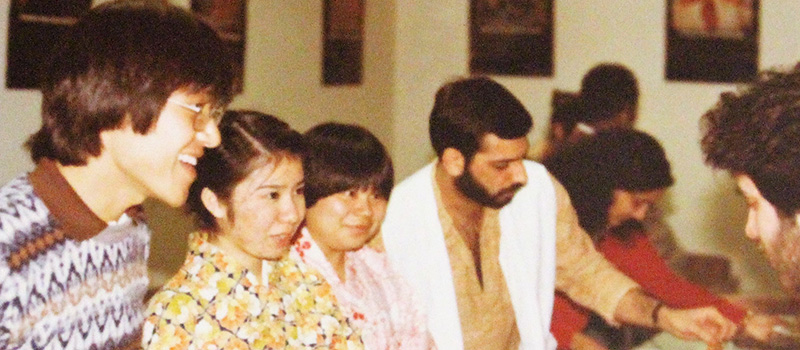 Hamon enjoyed taking photos at international student events, include this International Food Bazaar in the early 1980s.
Hamon enjoyed taking photos at international student events, include this International Food Bazaar in the early 1980s.
“She was the first in that job and she was very good at what she did,” says Maly, now retired and living in Grinnell. “She was the perfect person to start the on-campus role because she knew and understood better than anyone the special needs that international students have. They could be struggling with language or food, or there could be financial or religious issues. She helped them get through those adjustments.”
Nicole helped hundreds of international students acclimate to life at Grinnell well before social media allowed students to be more connected and culturally aware. Nicole and Dick often hosted dinners and parties for international students at their home in Grinnell.
“She was a really good listener, and because she wasn’t American, she didn’t come in with American cultural assumptions,” says Vos, who went on to became associate director of admissions at Grinnell. “She had that outsider perspective.”
In 1979-80, there were 34 international students on campus. This school year, there are about 350 from 46 nations.
“As international student enrollments began to grow in the mid-70s, institutions of higher education recognized an increased need for institutional support,” says Karen Edwards, the current dean of international student affairs. “Small liberal arts colleges, including Grinnell, were just beginning to actively recruit and admit international students. Engaging with the world was, and continues to be, central to our educational mission. We are grateful for Nicole’s inaugural leadership in this work.”
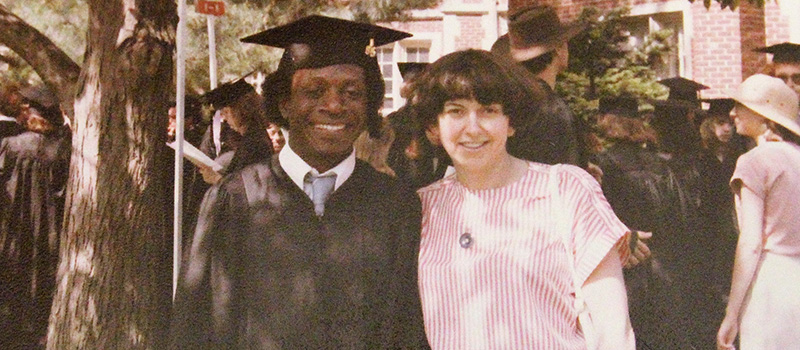 Hamon also took many photos at Commencement. She poses with Rex Osae ’85 after the 1985 ceremony.
Hamon also took many photos at Commencement. She poses with Rex Osae ’85 after the 1985 ceremony.
Hamon also developed the Host Family Program, which is still around today as the Friends of International Students. The program allowed students to have a place to discover American food and customs while host families from the community of Grinnell and surrounding areas got opportunities to learn about other cultures while supporting students.
She also helped students navigate an academic atmosphere that offered greater access to professors and a less formal teaching style than what many international students were used to. She corresponded with students before they arrived on campus, coordinated an orientation program, was a liaison with Academic Advising, Students Affairs, and faculty advisors; assisted with visa issues; and coordinated an ESL class through the Writing Lab.
“Nicole wore so many hats and got to know the students so well throughout their four years,” says Maureen Fitzgibbon, who succeeded Hamon in 1987 and is now director of the Center for Careers, Life, and Service Government and Social Service Career Community. “At the time it was a one-person office and Nicole was counseling, advising and helping them adjust to a new culture. She had to be very independent and resourceful and use contacts and networks to build the program.”
In 1987, Nicole, Dick and their two young sons, Eric and Carl, moved to California when Vos became the dean of admission and financial aid at Claremont McKenna College. In 1990, Nicole become the director of study abroad at Claremont McKenna, a job that took her to dozens of countries. She held that job for 18 years, until she retired due to illness. On Aug. 10, Hamon died peacefully at home.
“She was a lovely person and someone that students really loved,” Fitzgibbon says. “She was so instrumental in their success at Grinnell.”
Frank Thomas ’71
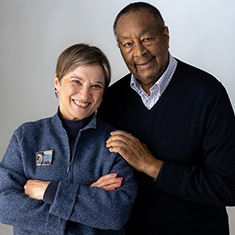 Sheena Brown Thomas ’71 and
Sheena Brown Thomas ’71 and
Frank Thomas ’71
In a turbulent era when Grinnell students debated civil rights, the Vietnam War, and other weighty issues, Frank emerged as a quiet voice of reason. A history major and founding member of Concerned Black Students, Frank “was a confidant to many on multiple issues,” says Mary Brooner ’71, “and that was a trait that lasted his whole life. He was a close to the vest, inside negotiator. He wasn’t splashy, and he had an ability to listen that was better than anyone on campus.”
Thomas returned to Grinnell two decades later at a time when the administration was grappling with how to recruit more Black faculty members and students. From 1991 to 2009, he served in a variety of senior administrative roles – as vice president of human resources, senior counselor, and vice president for diversity – guiding the way toward a more diverse and inclusive campus, and lending support to students and faculty.
Thomas was born in Helena, Arkansas, and moved to Chicago’s South Side during the Great Migration. He graduated from high school, then worked for five years before entering Grinnell in 1967.
“When I first got to Grinnell and hung out with him, I didn’t know that Frank was six years older than us,” says JC Labowitz ’71. “It soon became clear he was an older, mature person, as opposed to some of us who were neither. He was very much the calming source of wisdom in an era when there was a lot of craziness around. He wanted to work with the structure to get things done, rather than have confrontation for the sake of confrontation. He was interested in working within the system to make changes, rather than tearing the system down.”
Thomas met his wife Sheena Brown Thomas ’71 at Grinnell and the two were married in August 1970. After graduation he earned his law degree from Indiana University and held several legal jobs, including at the Iowa Attorney General’s office.
When he returned to Grinnell, Frank went to work on how to better serve the needs of a small but growing population of non-white faculty members and students.
“In the 1980s there was increasing dissatisfaction among Black students with the small number of minority faculty role models,” explains Dorothy Smardack Palmer ’62, who worked in admissions and in alumni relations. “We needed to do something, so several of us organized a committee to bring Black alumni back to campus, talk about the situation, and explore options and contacts. Frank helped guide that effort.
“His personality was special,” Palmer adds. “He was a listener, soft-spoken, and he held back until he had something to say. He took pride in listening to Black students to make their Grinnell experience as positive as possible.”
Frank took an active role in his mentorship of Posse Scholars and faculty members. Associate Professor Kesho Scott, Grinnell’s first female, Black tenured professor, called him a mentor and a friend.
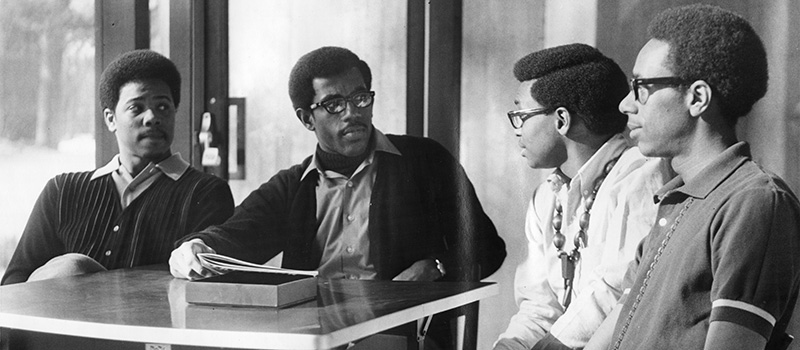 Thomas, right, is joined by Booker Carter '71, Ernest Weston '71, and Gregory Coggs '70 at a 1969 campus meeting.
Thomas, right, is joined by Booker Carter '71, Ernest Weston '71, and Gregory Coggs '70 at a 1969 campus meeting.
“He was a giant, but he was gentle and quiet and a background person,” she says. “His greatest strength is that he was observant, precise, and strategic in how to make things happen. For a new professor like me, he was instrumental in helping me not make mistakes. He mentored me in a way so I could be more polished and effective.”
The College had 17 Black faculty members for the 2020-21 academic year, and Thomas helped lay the groundwork for that to happen, Scott says. “He was able to educate the people in charge. He helped mentor before there were mentoring programs. He did what needed to be done before it became institutional work. He understood what needed to be done because he was a student himself here, and he loved Grinnell. Frank was my example to stay and do the work, even when the work isn’t understood. When people talk about diversity work – he was doing it before it had that name.”
Deanna Shorb, dean of religious life and chaplain, arrived on campus in 1996 as the first female, and first full-time, chaplain (ordained in the United Church of Christ) at Grinnell. Thomas, who was also involved in United Church of Christ, made Shorb feel welcome. “Whenever I needed help, he made it happen.” He stopped by to make sure Shorb was settling in, and he introduced her to administrators and other faculty and staff.
After Thomas retired from Grinnell in 2009, he started a new position at Plymouth United Church of Christ in Des Moines, where he served as pastoral residency coordinator until 2018. He mentored several associate pastors as part of the Transition into Ministry program. Frank passed away on June 20.
“Sheena and Frank were a Grinnell couple, a Grinnell family, without a doubt,” Labowitz says. “He was an anchor of concern and rationality and always available for whatever you needed him for. We all feel his loss.”
— by Anne Stein ’84